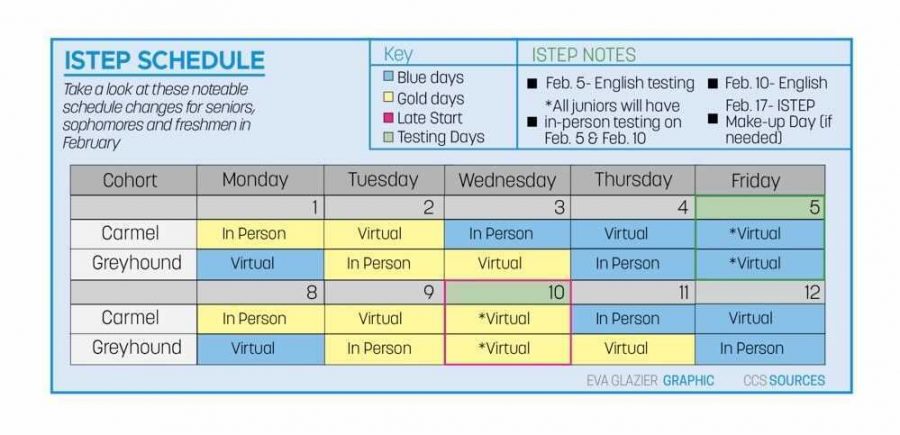With COVID-19 making schools resort to online learning this past spring, the Indiana Department of Education (IDOE) announced the cancellations of many of its state standardized tests, including the Indiana Statewide Testing for Educational Progress Plus (ISTEP+).
Because of this, the class of 2022 could not take the ISTEP+. Taking and passing ISTEP+ or receiving a waiver for the graduation qualifying exam is required to graduate high school in the state of Indiana.
Junior Karina Stoltz said, “I felt it impacted me positively when it was canceled last year because I got to show my strengths in the classes I most enjoyed instead of having to take a state test that I might not do well on. ”
However, this year, juniors will have to take ISTEP+ to make up for their missed tests last spring.
According to Assistant Principal Joseph Schaller, all ISTEP+ testing will take place in February. The English part of the test will be taken on Feb. 5 and the math part will be on Feb. 10, which is also a late start. During those days, freshmen, sophomores and seniors will have a virtual day. Juniors will arrive at school and go directly to their testing locations. Juniors will stay at school the entire day and have breaks throughout the day.
Schaller said, “It is a state standardized test, but it still should be on graduation requirements for sophomores.”
This means juniors will be tested on the English and math state standards of their sophomore year.
Schaller said he advises students to get a good night’s sleep the night before and eat a healthy breakfast before coming to school.
Stoltz said ISTEP+ offers unneeded stress.
She said,“I don’t believe ISTEP is important (because) every person learns in all different ways and testing may not be one of them. Students also already get tested on what they know during class (so) I don’t believe they need to be tested again through ISTEP.”
In addition to these changes, those in the class of 2023 (current sophomores) and beyond will be required to fulfill different graduation requirements than earlier graduating classes.
These younger students must graduate with a high school diploma or go through the process of opting out. They must also learn and demonstrate employability skills through completing at least one of the employability skill requirements: service-based, work-based, or project based learning experience.
According to assistant principal Brittany Wiseman, some of these learning experiences can be earned in school.
“Some of the requirements can be earned in school, through some of our classes, like Health Science Education॥: Nursing, or Emergency Medical Services, etc.”
According to the IDOE, students can earn the service-based learning requirement through clubs such as Key Club, student council participation, participation in sports, Future Farmers of America, or through Health Occupation Students of America (HOSA). Students can fulfill work-based requirements through internships and Capstone courses, job shadowing, career and technical education (CTE), as well as through registered apprenticeships. Project based learning can be achieved through programs such as My Community, My Vision program with IUPUI, ACE mentor program and evGrand Prix program, as well as others.
The last requirement of the graduation pathways are postsecondary competencies. This includes graduating with honors diploma or taking tests such as SAT or ACT or ASVAB. Students can also fulfill this requirement by completing a federally recognized apprenticeship, or completing certain classes for AP, IB, dual credit, or CTE courses.
Wiseman said that the graduation pathways are more inclusive of those who wish not to take many standardized tests.
Stoltz agrees with this.
She said, “I don’t want to take standardized tests because it’s not one of my strengths. Even though it won’t affect me, it’s good for those that it will affect because they will be less worried about having to take tests and work on something they want to pursue.”































![What happened to theater etiquette? [opinion]](https://hilite.org/wp-content/uploads/2025/04/Entertainment-Perspective-Cover-1200x471.jpg)













































![Review: “The Immortal Soul Salvage Yard:” A criminally underrated poetry collection [MUSE]](https://hilite.org/wp-content/uploads/2025/03/71cju6TvqmL._AC_UF10001000_QL80_.jpg)
![Review: "Dog Man" is Unapologetically Chaotic [MUSE]](https://hilite.org/wp-content/uploads/2025/03/dogman-1200x700.jpg)
![Review: "Ne Zha 2": The WeChat family reunion I didn’t know I needed [MUSE]](https://hilite.org/wp-content/uploads/2025/03/unnamed-4.png)
![Review in Print: Maripaz Villar brings a delightfully unique style to the world of WEBTOON [MUSE]](https://hilite.org/wp-content/uploads/2023/12/maripazcover-1200x960.jpg)
![Review: “The Sword of Kaigen” is a masterpiece [MUSE]](https://hilite.org/wp-content/uploads/2023/11/Screenshot-2023-11-26-201051.png)
![Review: Gateron Oil Kings, great linear switches, okay price [MUSE]](https://hilite.org/wp-content/uploads/2023/11/Screenshot-2023-11-26-200553.png)
![Review: “A Haunting in Venice” is a significant improvement from other Agatha Christie adaptations [MUSE]](https://hilite.org/wp-content/uploads/2023/11/e7ee2938a6d422669771bce6d8088521.jpg)
![Review: A Thanksgiving story from elementary school, still just as interesting [MUSE]](https://hilite.org/wp-content/uploads/2023/11/Screenshot-2023-11-26-195514-987x1200.png)
![Review: "When I Fly Towards You", cute, uplifting youth drama [MUSE]](https://hilite.org/wp-content/uploads/2023/09/When-I-Fly-Towards-You-Chinese-drama.png)
![Postcards from Muse: Hawaii Travel Diary [MUSE]](https://hilite.org/wp-content/uploads/2023/09/My-project-1-1200x1200.jpg)
![Review: "Ladybug & Cat Noir: The Movie," departure from original show [MUSE]](https://hilite.org/wp-content/uploads/2023/09/Ladybug__Cat_Noir_-_The_Movie_poster.jpg)
![Review in Print: "Hidden Love" is the cute, uplifting drama everyone needs [MUSE]](https://hilite.org/wp-content/uploads/2023/09/hiddenlovecover-e1693597208225-1030x1200.png)
![Review in Print: "Heartstopper" is the heartwarming queer romance we all need [MUSE]](https://hilite.org/wp-content/uploads/2023/08/museheartstoppercover-1200x654.png)



